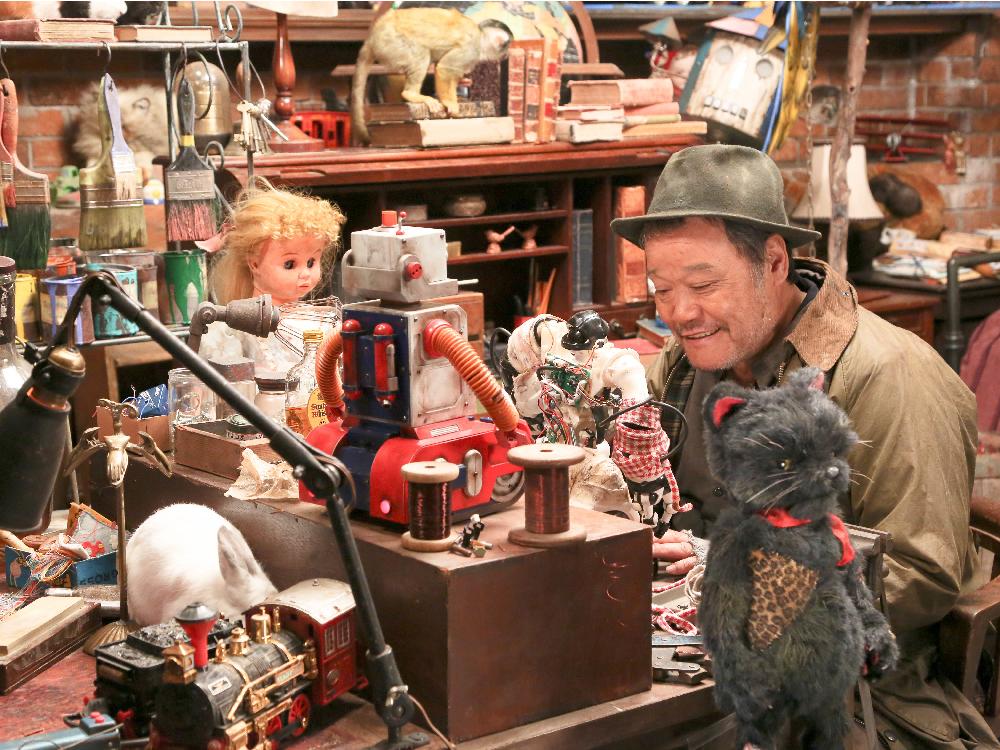By Chlotrudis Independent Film Society
Rating: 5 cats
Director: Sion Sono

Original language title: Rabu & Pîsu
Country: japan
Year: 2015
Running time: 117
IMDB: http://www.imdb.com/title/tt417349
Jason says: “The first of three Sion Sono films being shown at this year’s festival is a joyous, crazy delight, piling whimsy ever-higher even while Sono reveals a darkness behind it. The great bit, though, is that the pieces that may make an audience uneasy never poison the joy surrounding it, even as Sono finds himself springing imagery on the audience that could horrify if handled differently.
“That’s doubly impressive, because the film really starts out feeling really loose, as Sono follows loser former musician Ryoichi Suzuki (Hiroki Hasegawa) through a series of embarrassments, including missing out on connecting with the girl at the office who might kind of like him (Kumiko Aso), until he buys a turtle, involves it in some weird fantasies, and then flushes him down the toilet as his co-workers continue to bully him, only for ‘Pikadon’ to have his own adventures in the sewer. What he finds there is almost unbelievable, but amazing, and draws so much attention that it’s easy to miss that there’s important stuff going on topside.
“The films doesn’t split entirely in half once Pikadon goes down the drain, but there are two fairly distinct tracks. Topside, Sono makes a great story of ambition and desire for something out of reach corrupting pure instincts, of extreme self-confidence and self-doubt being equally destructive. Losing his turtle brings a raw, powerful anger out of Ryoichi, and that fuels him as a musician in the way than constant grinding disappointment never did, though success has a way of eating away humility. Sono presents the music industry ‘Wild Ryo’ plunges into as a force of nature that is less cruel than something that had enough momentum to be unstoppable before he ever got near it, and Hiroki Hasegawa changes up his game to match it: Where his sad-sack nerd seemed a bit like exaggerated mugging at the start, his unleashed ego is monstrous but entertaining later. Hasegawa’s Ryo becomes a broad caricature of the worst that rock stardom can bring out in a person, right down to how Kumiko Aso’s Yuko gets pushed back into the corner because, as correspondingly nerdy as she is at the start, she’s strong enough in her convictions not to go on that ride.
“Downstairs, in the sewer’s ‘Lost and Found Heaven’, Sono engages in what looks to be pure children’s fantasy, with all the lost toys and animals that have drifted down there being given the power to speak and move on their own thanks to an old man (Toshiyuki Nishida) who makes magic candies and seems a kindly caretaker of this subterranean island of misfit toys. There’s some darkness there, too, whether abandoned toys are openly resentful or making excuses for the owners that let them go, and Sono will push that harder than many would expect, to a jaw-dropping conclusion. In the meantime, though, there is much delight to be found here: The lost ones have pure, childlike personalities and the charming voice work to go with them, and Sono’s crew animates them with puppetry that may occasionally be a bit simpler than strictly necessary but which never lets the story down. Toshiyuki Nishida is both kind of funny and scary in the middle of it, playing his character like he’s the wise and kindly human cast member of a children’s television show, but never losing track of how he’s in a sewer and that it might be easy to see those shows as the workings of lonely, delusional minds, though that’s seldom at the forefront.
“For all the satire and darker undercurrents, Sono tell his story with earnest joy. Take the title song, which recurs throughout the movie as a massive pop hit – what starts out as a raw outburst becomes a popular anthem and then a commercial hit, but it never stops being a good song, and the way Sono keeps coming back keeps it feeling fresh while still making his point. The absolute best, though, is how the whole thing culminates in a finale that is both incredibly cute and hilariously destructive, without ever getting smirky or superior, even as it’s a hilariously direct callback to a scene from earlier. He almost dares the audience to be cynical, because it’s easy to see some of what he does being revisionist and ‘adult’, but pulls back in a delightful way.
“As those two threads collide in fantastical fashion, some of what Sono has been doing becomes clearer: He’s made a story about rebirth and renewal which demonstrates them as being both never-ending and a frequently destructive processes, paid for by surrendering something very basic in exchange for the new start. This is most dramatically shown as the more apparently playful parts reach their climaxes, but once the film is over, the whole thing seems steeped in the idea.
“I don’t want to say too much else, because this is a film that really deserves to surprise people. I can see it becoming a very fun alternative to the usual come the holidays, even if it plays just as well in July. 5 cats
“Seen 26 July 2015 in Theatre Hall Concordia (Fantasia International Film Festival: Camera Lucida, DCP)”
